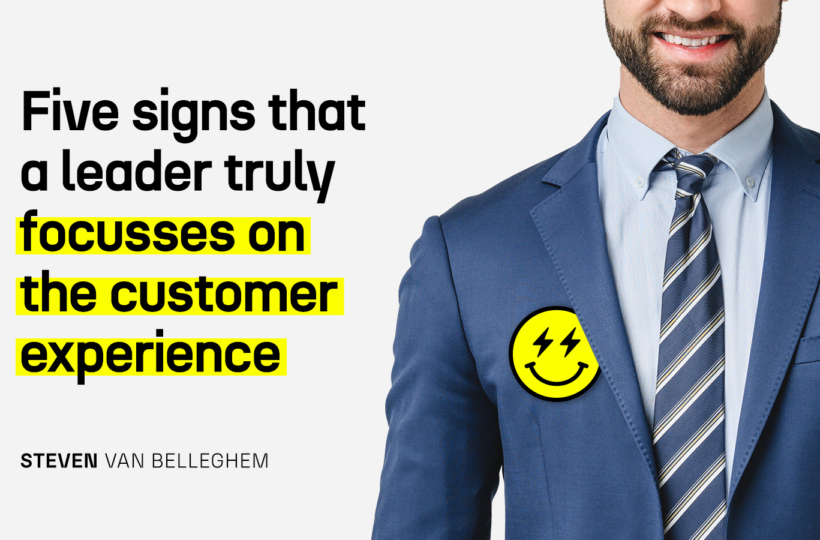5 signs that a leader truly focusses on the customer experience

One the top characteristics of companies with a strong customer culture – which I wrote about in my brand new book A Diamond in the Rough – is that customer centricity is not just an empty slogan on a wall or in a PowerPoint. At these companies, leaders do not try to convince their employees that you are customer-centric. They make them believe they are, through their actions.
“But how can we make our employees believe, Steven”, is one of the questions I get a lot in this regard. And so I wanted to share 5 simple actions – that you can incorporate into your overall leadership style – that will greatly increase the credibility of your focus on the customer experience.
Create a positive flow
Try to make the most of every opportunity to share positive customer stories. Not all customer experience feedback needs to be in the form of an official message. If an email arrives with positive feedback, or a customer says something nice to a co-worker, or you see a positive review on social media… all of these can be shared with the rest of the team and the whole company.
A flow of positivity from customers helps generate a sense of pride amongst all your employees. By drawing attention to that positive feedback, your employees also notice how important it is to you.
Have their backs
One of the friendliest pursers I have ever come across was on a flight I took from Frankfurt to Oslo. I felt so sorry for the poor guy. He apologised for four (!) different situations during that short flight. Sorry that we left late. Sorry that the luggage compartment is so full that you must fly with things on your lap. Sorry for not having any information on connecting flights. Sorry that you must deboard through the middle door of the plane instead of the front.
I wondered how someone who had to deliver so much negative news could be kept motivated. So much went wrong on that flight and there was no support from the purser’s colleagues. He was on his own and things were not going well. Such powerlessness and perhaps frustration does not feel good, especially for someone who is so intrinsically motivated. Powerlessness erodes motivation. As a leader, it is important to support people, to find ways that you can help them do their job better. Things will go wrong from time to time, but if employees feel supported when things go wrong, their level of motivation will rise.
Where is the party?
You do not have to try hard to find reasons to motivate your employees. Fifty eight percent of company employees say that regular positive feedback and appreciation, a simple ‘Thank you!’, ‘Well done!’, or ‘Great job!’ has a very positive impact on their morale. Giving credit occasionally to an employee who has done something customer-focused also demonstrates the importance of the customer experience to the management and the company. For instance, Keybank, a regional US bank, launched a programme in which employees could give each other ‘Key Kudos’ for a good customer-focused action. At San Francisco airport, Keybank’s team has a ‘you are one of a kind’ philosophy. Those who are exceptionally kind to customers can be honoured through this programme. Actions that are celebrated in a company are seen as something important by employees. Celebrate your customer experience successes and it rises in importance.
Micro decisions
Micro decisions are of paramount importance to the theme of this chapter: how small things we do or say and not say and not do have a huge effect on our credibility and on the ability of those around us, and especially those we lead, to believe in us. Think for a moment about seemingly unimportant situations where our credibility is judged. If an employee has done something exceptional for a customer, but at a price a bit more than you would like, how do you respond? Do you say, ‘A super initiative. I’m glad that the customer is happy.’ Or do you say, ‘Well done, but fortunately we don’t have that cost with every customer.’ What part of the latter response will the employee remember?
The team leader thinks they have complimented the employee and the employee thinks they have been warned not to repeat this gesture to any customers again. It is the little things that determine the future behaviour of your team members.
Do you have a Mr Wolf?
When Marsellus Wallace from the cast of Pulp Fiction had problems, who did he call? Right! Mr Wolf, a ‘cleaner’ who cleaned up difficult problems. Every now and then you need someone like Mr Wolf to push through your customer experience strategy. A person you can rely on 100% who has the necessary decisiveness, authority and common sense to help you sort things out. As Churchill said, ‘There is no problem so complex, there is no crisis so big that it cannot be solved within 20 minutes.’ Sometimes you need decisiveness instead of endless deliberation. That’s when you call in your very own Mr Wolf.
Did I miss any characteristics? How do you, as a leader, make your team believe that customer experience comes before anything else?